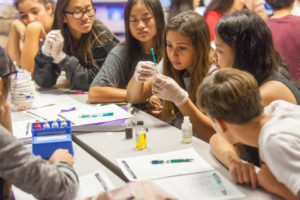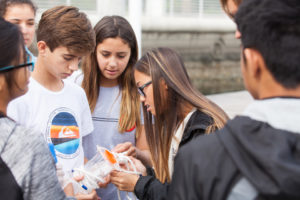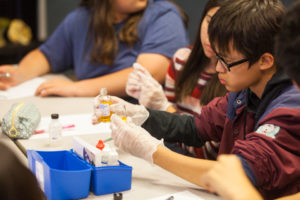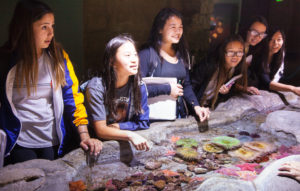By Lauren Nguyen, Staff Writer
Accelerated biology teachers Deborah Brown and Jennifer Allen traveled with their students to the Aquarium of the Pacific for the first time to explore the aquarium exhibits and participate in a program with the Aquarium that allowed them to do a 2-hour lab testing the water. The trip correlated with the unit they’re currently studying, ecology.
A full day trip, the students departed on the bus a little after the start of first period and returned to school close to the end of sixth period.
The main focus of the trip was a Dissolved Oxygen Lab, in which students tested the levels of dissolved oxygen in samples of water they took from the harbor adjacent to the aquarium. They compared their results to their original hypothesis they had formed prior to the trip and prepared for a discussion when they returned. They spent the remaining time touring the rest of the aquarium and filling out a scavenger hunt packet they had been given.
As the person who initiated the idea of the field trip, Brown says “I can’t teach everything in biology, there’s no way, and I love the ocean, I’ve always loved the ocean and I thought this would be a great experience for students to learn from something besides me.”
In bringing the program to her students, she wanted to emphasize the concept of interconnectedness, hoped they would realize how close they were to the ocean, and realize the impact their actions have on the ocean they reside next to. Additionally, she wanted to bring field trips into her classroom because she felt her students would be more enthusiastic in a setting outside of the classroom and wanted to give them the chance to apply their knowledge.
The trip was the first field trip held for accelerated biology classes and although there were mixed responses among the students, the majority of the students said that the trip was fun and effective in solidifying their knowledge. Briana Jaiyan (‘21), a student who went on the trip, says, “It totally gave us a visual representation of basically what we learned.”
On the other hand, Brown’s sixth period class also agreed that the lunch time allotted was messed up. They felt the time management could have been balanced out better since many students recalled how the volunteers went through the exhibits quickly, ushering the students on and leaving behind the students who weren’t aware their group was continuing onward while other students said that too much time was given to view the exhibits since many exhibits were down for maintenance.
David Beam (‘21), another student who went on the field trip the second day explains, “The people there were really rude and the stuff was expensive, like the water. They kept changing the rules on us and it was kind of just disorganized.” He continues saying, “I think it had the potential to be a fun experience, but just due to all the other factors on the aquarium’s part, not our part, it kind of made it not fun for some people.”
There is no doubt the trip to the aquarium did have minor drawbacks, but Brown’s main purpose for the field trip was achieved.
Brown says, “The aquarium did a great job explaining the process and tying it to the topics we covered in class. I will definitely do this field trip again next year!”









